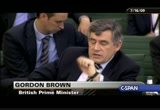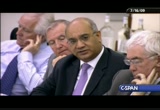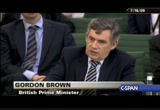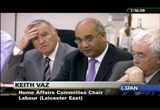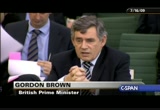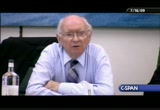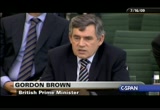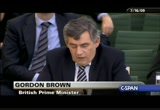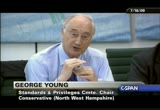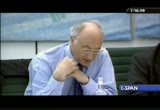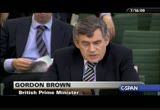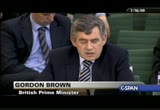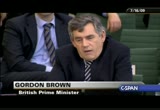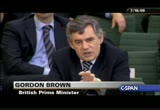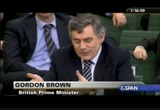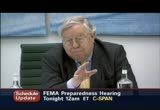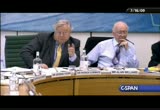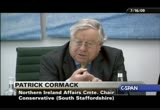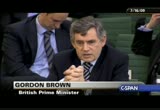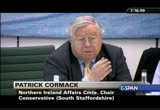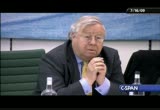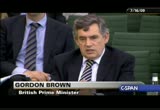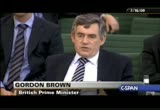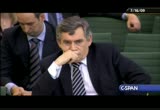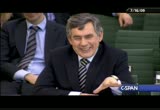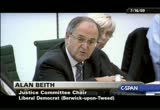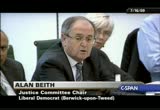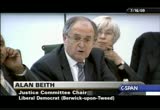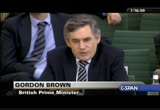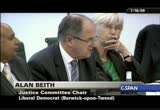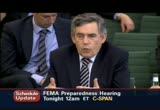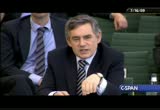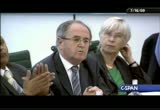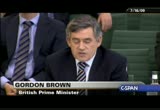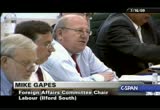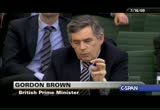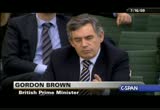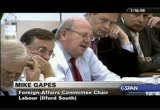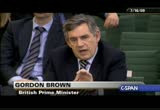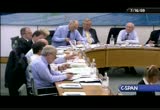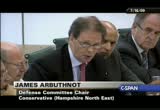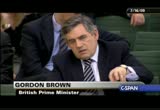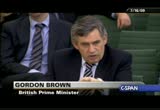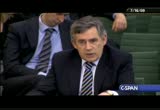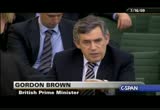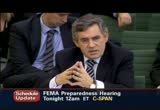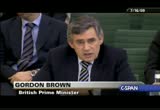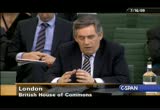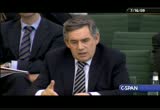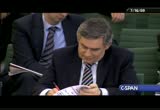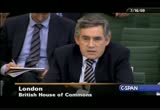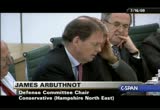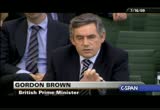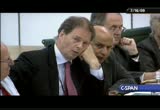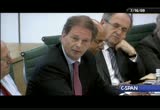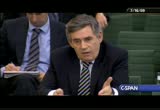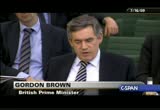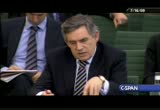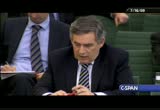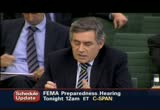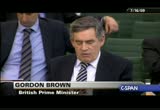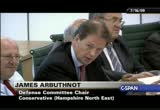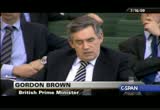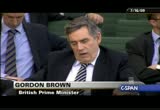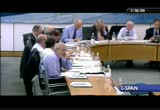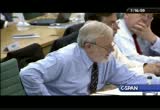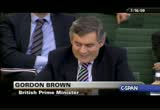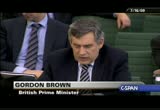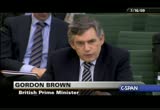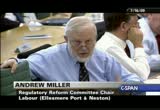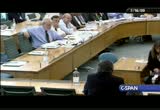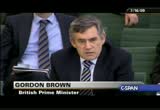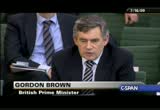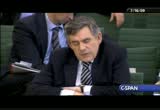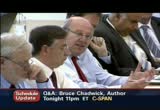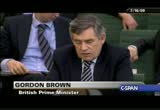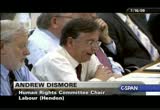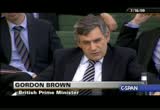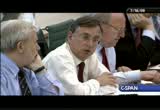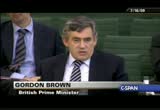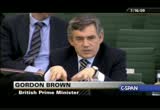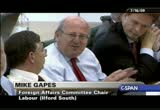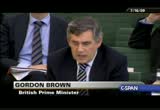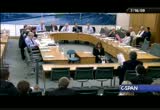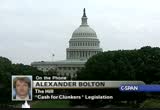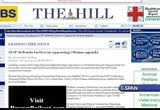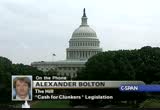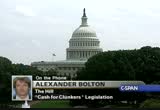tv Political Programming CSPAN August 2, 2009 9:30pm-11:00pm EDT
9:30 pm
announced as far as tier one of the point system, changes in that. i suspect that the numbers coming into our country to work will be less this year as a result of the changes that we have made. we have looked at tier one, and tier two, and we continue to look at the most effective way of having a policy that allows us to have the skills that we need and that mansion migration of the interests of the country as a whole. >> and you are confident that the current rules will mean that the resident labor market will be offered jobs first before companies move and look abroad to find people abroad to fill those vacancies? >> that is the agreement. we have taken steps by given people first shot.
9:31 pm
we have toughened up labor mark tests for employees. the role in that the job center plays in matching people to forces will reinforce this change. and that will allow people to get the jobs available. of course we will draw on skills from other countries and that is what the point system is all about. but it is clear that the changes in the point system will have an effect on the numbers of people coming into our country. >> one of the source of difficulties is intra-country transfers. as you know, there have been disputes around the country where there have been protest it is outside the oil refinery, people very concerned that this loophole allows companies to bring workers from abroad, albeit within the e.u. to take their jobs. what is the government doing to look at that issue and deal with it?
9:32 pm
>> it is very clear it is a sensitive issue. in the case of the construction industry, we saw an agreement where employers would give additional jobs that they had available through the job center in the local areas. i think it is very important to recognize that the numbers of people coming from within the european union to britain is reduced. equally, under the point system, the number of people coming from non-e.u. countries is less than what it would have been without the point system. we want to be a country that can draw on the skis and talents of people around the world. we want them to have a contribution they can make to our country. and we want them to accept responsibilities in our country, and that's why we have changed the nature of the test for my grant workers, but also the test for citizenship. and i think it is important to get the rights and responsibilities in the right
9:33 pm
place here. >> as you know, the recent elections, they won two seats, and they say this. the nationalist message is simple. when the bosses and the foreign scabs come from your job, it may be too late to fight back. we have to draw a line in the sand and force the government to protect our own people now. these strikes and protests are spreading, and they need to do so further and faster. are you absolutely clear that there is enough clearwater between the government's position on this issue and the d.m.p.? >> absolutely. the british national party is a party that makes discrimination and racism a central par of its message and that is wholely unacceptable. i don't believe a party with these views has a place in politics. what i want to do and so that i am not misunderstood, in a global economy where companies
9:34 pm
can go anywhere. where people who have skills have got the opportunity to work anywhere, i want the british people to have the skills that are necessary so that we can get these new jobs in the global economy. and i want to empower young citizens with the chance to having the skills to get the best jobs available. that is at the heart of our employment policy, and it is at the heart of education policy as well. that is a very clear dividing line between what we want to do for every citizen and the discrimination which is at the center of their policies. >> your immigration minister have in the past suggested there ought to be a cap on the number of people coming in. do you believe, prime minister, that there is a cap, that it should be put at, say, 70 million? >> the points system creates the opportunity for us to be clear about the skills we need
9:35 pm
and whether we want them. we can adjust that point system whenever it is necessary to do so. but anybody who has proposed a cap ends up with proposals that exclude so many numbers of people and so many groups of people from that cap that it is not an effective cap at all. >> thank you, prime minister. >> that conclude that part. >> what would you say, prime minister, to the public sector union leaders who are at the moment expressing concerns about numbers employed or future recruitment? the public service? >> that we will do what is necessary to employ the people that we need in our public services. we've got to make sure that all our public services give value for money. we have to make sure they are all efficiently run and where we can achieve efficiency from the running of public services, we are prepared to make the tough choices necessary.
9:36 pm
we are employing 19,000 more nurses than 20 years ago, 20,000 more doctors, 30,000 more teachers, and 90,000 more teaching assistants. where we need mahinmi in the front line, we will want to make sure we get the best skills possible to do so. but where we need efficiencies in the department of pensions and the main land revenue service, by the new technology available and by the changes in the way the services are run, we will do so because we want the most efficient and best value for money on public services we can get. >> we new move to the constitutional issues. >> good morning, prime minister. >> good morning. >> let me start off with the rights commission. in your statement to the house on june 10, you expressed support of the establishment of the right commission on parliament area reform, and that support was greatly welcomed. we then had to wait four weeks until the government put the
9:37 pm
necessary resolution on the orders of the day. do you think that delay might have been minimized since the committee has to report by november 13? >> well, i think people knew that this was now part of the discussion. i think the chairman had already been effectively appointed. the three subjects of the committee's work were known, and i think the committee is now in a position to get on with its business. i don't think they are prevented from doing a report by november by what has happened because it is now very clear what we are expecting of them. i think one of problems is that some people on the committee may wish to go further, but we have the terms of the agreement. >> the premise of the committee has not been established, but we need time for debate before we can start. can you give a commitment that there will be time for debate? >> i will look at what you say. >> doesn't this underline a need for a better way for the house to mansion its business?
9:38 pm
>> as you know, sir george, what the committee is looking at is scheduling non-government business, and that is an important aspect of it. >> but the terms of reference have actually been changed, and they now embrace all business, not just non-government business. but are you able to give the sort of commitment about the right committee that you have about the kelly commission, that you are minded to accept the proposals is comes up with and the government is prepared to reling i wish its stranglehold -- rering wish its stranglehold? >> there are a number of issues we are looking at. obviously by owning up the issue of appointment of members and chairmen of the select committees and others giving their views they would like this to be a process, whether by election of all members of the house of commons, is one that is acceptable to everybody. i hope the committee will come
9:39 pm
up with recommendations we can accept. i am not going to give a prior commitment without knowing what we come up with. there may be a variety of ways people are considering. let's see what idea they bring to the proceedings the we will look favorably upon the recommendations of the committee. >> no blank check. can we look at the slightly broader picture? when you first became prime minister your first statement to the house said constitutional change will not be the work of one bill, one year or one parliament, but i can make changes that will transfer people from the prime minister and the executive. some of those changes were then included in the draft constitutional renewal bill. and at the government's request. the house of commons and house of lords rushed their consideration in 10 weeks, and we finished our work a year
9:40 pm
ago. since then nothing has happened. what happened to your commitment to constitutional change? >> a number of the measures i announced are already implicitly a practice of the government. the renewal bill is due to be published in the next day or two. it is important to recognize that it is the result of widespread consultation. and i think you understand yourself, sir george, that in the last few weeks what has prevented other bills coming forward is the need to have the parliament area standards bill that has been debated in detail , but the parliament area bill is due to be published next week. >> you have now added some additional measures to do with the house of lords. are you really confident that you can get the original bill plus the amendments to it through by may of next year?
9:41 pm
>> i think most parties are supporting the proposals we are putting forward, and most of the work comes from widespread consultation over a period of time. i think we have built up a con send us, you can public legislation without prior warning and then have the debate and controversies for a long time afterwards, or you can have the debate before hand, which is what we have done. most of the measures of this bill are known. >> you think the house of lords will let all the measures through? >> well, i hope the house of lords will accept it is a reasonable proposal designed to make progress from this issue when there is no justification in a modern democracy for a haired terry principle. >> the speaker, as he was shortly to become, made it
9:42 pm
clear he wants to clamp down on the choge. he says the punch and jude show is boring and bordering on contempt. do you go along with that? >> well, i would like to see the house of commons distinguish itself by being able to deal with, often in a nonparty political way some of the big issues of our time. the prime minister's question time has not ever been as far as i can see a vehicle for that to happen. the sad thing about the house of commons is that there are very big issues or country faces. and whether it is afghanistan, or whether it is issues that go right across that are moral issues that people are worried about, and we don't seem to be able to find vehicles that these issues can be debated to
9:43 pm
help the country. >> would you be prepared to enter into discussions, as his views team to coincide yours, about a fresh approach? >> every time someone has appropriatesed a fresh approach to that, it has never worked. i myself feel that at least -- whether it is prime minister's questions or other forums which in the house of commons we can debate issues, we have to show the country that we can seriously debate in a sensible way all the big issues that effect the country. i think this committee is a better form than the house of commons on many occasions, but i think we can do even better. how do we deal with the issues of globalization, nuclear power, some of the great problems of climate changes. the house deserves to do better itself in confronting these shution. >> when you say the house
9:44 pm
deserves to do better, when you said yesterday the opposition appears have no policies for jobs, to tackle recession, for recovery, was that the sort of bracive comment that the speaker was complaining -- abrasive comment or was this a serious contribution to political debate? >> unfortunately i had to tell the truth. the issue there was exactly, if you read what i think the leader of the liberal party was saying, he was saying we have no policies on this or that. the big issues of our team -- there is always going to be banter and knock-about in a place like the house of commons. but the sadness is that we have not been able, despite all the people around this table i believe wanting to do this, to show that the house of commons is the most effective place for debating the big issues that face this country. >> i am handing it over.
9:45 pm
>> sir george raised a laugh. now he talked about this constitutional renewal bill, and you didn't give a terribly effective explanation as to why it has been so long. but you rushed in the parliament area standards beal when the whole house was entirely happy that the financial aspects should be looked at by a body. but when everybody was deeply concerned about the implications of free speech, the clark put out a mem, the committee under the leadership of sir alan was very concerned. the committee under the chairmanship of mr. dismal was concerned. the bill left the commons with two of its major clauses deleted. the house of lords is set to work to tidy it up. can you give an assurance that the amendments made in thes house of lords will be accepted
9:46 pm
by the government? >> sir patrick, you have been in parliament long enough to know that we are not going to commit ourselves in this way merely accepting everything the horse of lords says. that would be quite wrong. i think the house of lords is looking at a bill that the house of commons has had a chance to examine and should take very seriously on how the house of common wants to reform its own affairs. >> that bill was so rigidly tame tabled that it left our house without the chance to discuss it at all. are you really happy with that? >> we faced a choice. the public are appalled and disgusted by the way some m.p.'s have dealt with their expenses. let's be honest. all of us here are saddened to know that some of our colleagues have done things that we thought would never happen. >> prime minister, that is not the point -- >> that is the point --
9:47 pm
>> please allow me to make this point to you. there is a complete consensus in the house that because of what was revealed during the so-called expenses scandal, that the fangs aspects should be looked at by an independent body. there is no dispute it. but you introduced a bill which had profound constitutional consequences, so profound that committees of the house were dead against it, so profound that we had the unprecedented circulation of a memo. we do not need to cirque prescribe parliament area privilege which is not ours, but the privilege of those who accept us here. was that truly your intention? >> as you know, the clauses that are giving people concern relate to criminal offenses. i believe that the hold-outs of
9:48 pm
commons has to be clear with the public of this country that it is prepared to accept the same disprince that we have imposed on other assemblies and roughly similar proposals to which we impose on local government. this in my view is not a breach of parliament area legitimacy or sovereignty. i think it is the right thing for us to do. we took into account some aspects as what was said. >> do you really think that elected members of parliament, including you, answerable to our constituents should be subjected to things for the way we conduct ourselves? >> i think unfortunately because of what has happened, that the self-regulation that was a feature of the way the house of commons worked cannot continue. we are bound to have some form of statutory regulation that we
9:49 pm
have a body subject to statute is able to deal with some of the affairs that were previously dealt with by us ourds. that is the only way forward. >> financially, prime minister, yes, but in other things, no. i think you will find that many people are deeply concerned about the implications of what you have just said. now can i turn briefly to the house of lords. you have found the house of lords exceptionally convenient. you have created many ministers, including your own unofficial deputy, and you found it convenient to have this body, and at the same time, and i don't want to enter into the merits or demerits, but you found it convenient, and at the same time proclaimed your desire to abolish the present house and replace it with an elected one. what would the do with the
9:50 pm
mantle of the future if that were to happen? >> if the second house were elected 100% or the majority of it elected, then ministers in a government of the future could come from that house of lords. but they would have to go through the procedures that enabled them to become members of the house of lords. >> but you wouldn't be able to hand-pick your savior would you? >> i'm not holding to that as a constitutional principle. it is a fact of the matter that the present system has allowed ministers to be appointed who are part of the house of lords but also part of the government. but that is something that could change, and i've got no theological position on protecting that particular part
9:51 pm
of the constitutional arrangement that exists at the moment. it has serbed us well because we have managed to bring in people to give us public service. we would have had no opportunity in the present system to have done that. we have just seen professor darcey, who has presided over the health service review, and done an excellent job. his first wish was to do that and then be able to continue his work as an academic researcher, and so he has returned to that. i think we have benefited from his experience. >> we under that. final question. about a year ago you compared yourself with heath cliff. >> i never did. >> would you compare lord mantle with sw emp ngalli? >> i won't make comparisons. >> thank you.
9:52 pm
>> this is in-depth scrutiny than the knock-about on the floor of the house. does that mean you would like to increase the number of these meetings? >> well, as you know, we have talked about this. i think i have been very generous in my time. one of the things i was noting is that in the last two years, i think i have made 24 statements to the house of commons, i have been determined to make as many oral statements to the house of commons on important issues. side by side with other scrute nissan like the debate and other questions, i think on an average of once a month i have made a statement to the house. that shows we are determined to make what we do scrutinized by the house. >> we new move on to constitutional structures. >> i want to take the opportunity to correct an impression.
9:53 pm
my committee asked him to give evidence, and presented very careful evidence, very powerful evidence, and led to the report the committee made, and which government ministers have acknowledged in the lords and led to the decision to, in one case, remove the clause and accept the removal of the clause which the house determined. turning back to the point which sir patrick made about the laws. you have now appointed 10 people to the lords to act as ministers, and one to act as advisor. four of them have resigned or given their notice. but all 11 of them are now legislators for life, owing their appointment to you. at the same time you plan to remove the people you didn't appoint without us having any certainty that they will be replaced by elected members of the second chamber.
9:54 pm
are you not step by step just creating a more and more appointed house with very little incentive for a future government to carry out a real reform. >> first of all, the hereditary principle, you and i would agree that the hereditary principle has no real long term place in a parrish constitutional future. >> but i am talking about appointment -- >> i said first of all, the hereditary -- and i think there is now general agreement. it is amazing perhaps it has taken so long since the first parliament act in 1911 and the second in 1948 that we have got to that position where people agree that the hereditary principle does not play the same role. the second issue is how to you constitute a second chamber if at all. in the modern world, people will want a substantial part of
9:55 pm
that to be elected in principle. of course that is where we are. i said that we would put forward proposals later about how we propose to move from the abolition of the hereditary principal to the next stage of reform. >> but in practice, you are creating a more and more appointed second chamber in which a higher and higher proportion of the membership is appointed by the prime minister of the day, a situation which could go on for a very long time. >> until there is an agreement about the house of lords is all or partly elected. until then, the only way to have people in the house of lords through appointment. so the house of commonts made a decision that it wished 80% of the house of lords to be elected. i think all parties came around
9:56 pm
to supporting that view, and that is something we are going to have to look at for the future. you are absolutely right, if you abolish the hereditary principal, which all of us want to do, then you have to have an election. >> there are a couple of things you can do in the meantime which might help with the real anger that is developing in the commons, that some of the moats senior and powerful ministers in the government can't be brought in front of the commops as a whole, but before committees. any member of parliament can change doctor can challenge them in the way that others can? >> this is an issue which is an interesting constitutional one, is it not? house of lords ministers appear before house of commons select committees, and house of
9:57 pm
commons ministers appear before house of lords select committees. as for the running of the chamber of boast houses, whether it be westminster hall or the chamber of the house of commons itself, that has not applied. i would say in principle there is no reason why it couldn't happen. i think in practice you would find quite a division of opinion as to whether they wanted it. >> the other possibility is the ministers you want to appoint is to appoint people as ministers who are not members of either house. that is not without precedent. the solicitor general of scotland is not a member of either house, but still have to be brought to the house for answer for what they do? >> i doubt either the house of commons or the house of lords would accept a situation where the minister in charge of a department is not a member of one of them and accountable to
9:58 pm
one of them. that would be very interesting if you applied it to the treasury or transport or home office. i don't think you would find a huge amount of favor. i think you have -- >> you are not thinking of appointing a chancellor ? >> i am not proposing that. i think you were proposing that as a possibility. i think the vast majority of government members are people who are members of the house of commons. there are a few members of government who are members from the house of lords. in certain instances where there is a specialist or skill that is available in health, business or in trade, or in overseas development, we have brought in people that we believe have great talents to offer. i think if you look at the individuals themselves, they are all people who have served the country well. if a period of public service is less than parliament, that
9:59 pm
is because we have persuaded people to give up demanding occupations for a period of time to serve the country in this way. >> they are now lendl slayer for life and not allowed to resign from that position? >> i think you will find they are people that are respected for what they offer the house of lords. >> you said you personally favor a written constitution. you recognize that it would be a historical shift which would need the widest possibility consultation. what would that consultation be? >> well, it has to be a far wider consultation than just the m.p.'s and the house of lords and political closes looking at this issue. the fact of the matter is we have a written constitution for parts of the united kingdom and for parts of the constitution. so the idea that our constitution is unwritten has never been true. it is written down in all sorts of different places. the idea that parts of the united kingdom don't have a constitution is untrue as well.
10:00 pm
the scottish parliament, the northern ireland, the welch assembly bill and others give the functions and responsibilities for government both exclusions and inclusions for different parts of the kingdom. the european union membership is also written in legislation. the human rights act is a very important part of setting down the individual liberties of the citizen. the question is whether you are prepared to and want to face up to the difficult issues of what is included and what is not included. and the issue of the role of the judiciary and parliament area sovereignty, something we dealt with in a uniquely british way in the human rights act are important. >> what i'm trying to establish is generally what the consultation process is. he said the other day he was talking to people in back berry about it. we need something more extensive about it.
10:01 pm
10:02 pm
i except that that raises the question of whether one parliament combined another, and i accept also that there are very difficult questions already raised by the existence of a supreme court or the coming in of a supreme court that have to be dealt with as well. i don't think the intention of written constitution in britain would be to give judges greater power over our democratic affairs. >> do recognize that having made a number of announcements about constitutional change, which is also been shown other party leaders as well, you have launched a process that does require something a bit more formal by way of consultation and you have enacted so far. in scotland, the constitutional convention played a significant part in shaping what happened. >> i would be happy to hear your views on that. there are lessons to be learned from the constitutional convention in scotland about how
10:03 pm
to proceed and what happened. it is true to say that over the last 12 years, with the devolution of power, with the human rights act itself, the constitution of our country has been changed quite considerably. i believe that the discussion on the bill of rights and responsibilities and on the written constitution as well as the house of lords and house of commons are very much part of the continuing debate. where were rigid whether we decide this should be part of a written constitution is something i believe we have to listen to the public on and we have to find a way of doing this. i will listen to whatever ideas you have. >> prime minister, this morning have made a written statement
10:04 pm
addressing the nuclear question in the 21st century. i have not actually seen the document, but i have seen your statements. in that, you commit the u.k. to reduction and eventual elimination of nuclear weapons and to ensuring that nations have access to nuclear technology for peace purposes. how realistic is it to have an aspiration of a world free from nuclear weapons, when we know that in this current world, there are so many problems and conflicts and the world is involved in so many difficult areas. it is very hard to see how you get there. >> that is the aspiration of president obama and the other governments. there is across party group in
10:05 pm
the united states of america with henry kissinger and others who will be proposing that this is the final destination of a defense and security policy. with the nonproliferation treaty did, and what we are now proposing with this document, the road to 2010, was to imagine things. it is said that we should give -- was at two things. we should do so by them relinquishing or surrendering the idea that they would ever have nuclear weapons, but we would in return help them get civil nuclear power. what is said was that the nuclear states themselves would seek to reduce their nuclear weapons. this is still, in my view, the nature of a bargain, a covenant between states and the world, that as we renew the non-
10:06 pm
proliferation treaty, we get an understanding that in return for relinquishing nuclear weapons, including iran and other countries, relinquishing the possibility of having nuclear weapons or having them secretly, we will say will make it possible for you to get access to facilities that will need to be there. we will do it on the conditions that it is safe and not leading to the creation of nuclear weapons. there may be a unique reputed -- there may be a uranium bank are bond in another country, but you have a uranium bond which is available. you answer this problem that lots of countries one access to civil nuclear power. they do not need to have nuclear weapons, but we can give the new technology without the risk of them moving to nuclear weaponry. in return, countries have to be
10:07 pm
prepared to reduce the nuclear weapons they have. >> your aspiration is what we have already had for the last 30 years. the nonproliferation treaty was set up on that basis. your statement also says, as soon as it becomes useful for our arsenal to be included in the broader negotiations, britain stands ready to participate and to act. when you put our nuclear arsenal into such a broader negotiations, what is our aim? is it just to reduce, or to eliminate british nuclear weapons? >> this is to be done only on a multilateral basis. we are saying that if there are discussions about the reduction of nuclear weapons, we are prepared to be part of these
10:08 pm
discussions. you are talking about a reduction of nuclear weapons. also, you have to remember we are at a critical moment. 50 years ago there were five nuclear weapon state. now there are nine or 10. the danger in the next few years is if one of the country's that is threatening to develop nuclear weapons against these nuclear weapons, then a whole number of other countries will exist. this is a critical moment where we have not yet made an explicit offer to the non-nuclear states that we can help them sufficiently with civil nuclear power. we have not found a basis of given civil nuclear power to states without us feeling that we are at risk that might develop nuclear weapons. we have to have a far better offer. the prize is to present --
10:09 pm
prevent further proliferation of nuclear weapons. that would be a disastrous consequences for the world. even if that were held by countries that were not prepared to use the nuclear weapons, there would be a greater danger that they would fall into terrorist groups. >> are you saying that our aim in putting our weapons into this broader negotiations, presumably at some point several years down the line, would be just to reduce, or would it be to eliminate? >> the long-term aim of all the countries is on a multilateral basis that nuclear weapons would no longer be necessary. that is a distant goal, as things stand at the moment. we would be prepared to be part of a negotiation in which we were, like america, russia, and other companies, some reductions.
10:10 pm
>> now we will go to questions about afghanistan and pakistan. >> in your letter you pay a great tribute to our armed forces. you say, despite the tragic losses, morale remains high. the current operations are succeeding in their objectives. tell us exactly, prime minister, what we are achieving in afghanistan. >> first of all, the current operation which i was referring to, panther's clock, is designed to make it possible for an area to be free of taliban influence as we approach the elections. for people in that area to fill the have a stake in the future of afghanistan, rather than be part of an area under the whip
10:11 pm
of the taliban. that operation is moving through this area, backed up by an afghan national army, and with the governor of helmond, is ready to provide services in that area, so people can see that the afghan government and civil society is able to support the local people in that area. it will lead to thousands of people in the elections being able to vote freely and fairly without intimidation, because the polling stations will be able to be placed in that area where they could not do so now. this is part of our operation and part of the wider operation being done by the americans in the region. it is part of our determination that these new elections in afghanistan can pass peacefully and freely in a democratic result can be achieved. what are trying to achieve in
10:12 pm
the -- in afghanistan and pakistan together? our strategy set out in april was a recognition that the terrorist threat that this country faced was in this crucible around the borders of afghanistan and pakistan, that we had to take action in relation to both, but the future lay not simply in military action, but in building of the afghan army and police and helping the pakistan authorities, and giving people in these areas a sense that they had a stake in the future of the country. i believe you have got to look at the operations that were involved as part of an afghan and pakistan strategy, and you have to look to this as not being simply a military campaign, but military action with brave and dedicated soldiers. i pay my tribute to our british
10:13 pm
forces. our military action complemented by our determination to train more of their people to be in the armed forces and police. >> do think people in afghanistan feel more secure? >> in many areas of back and stan, people do feel more secure. -- made -- in many areas afghanistan. and hellman's -- in helmund, it is sparsely populated. the areas of higher population are making progress with operation panther's claw. our ability to defeat the terrorist threat depends not
10:14 pm
only on what we can contribute militarily, but on what we can achieve by civilian as well as military effort in training the afghan army. it will have to be higher than 130,000. everybody has no doubt that for a territory as big as afghanistan, they will have to train an army to a higher number than that. you have to have a very big basis for an afghan civil society. riggs would you agree that too many people, both in this country and abroad, have very little idea of what our troops are there for, and do you think more needs to be done to persuade people of why our troops are there? and of precisely how they are going to succeed? >> i think that is true, that we have got to do more to show people the reasons why we are there and still there.
10:15 pm
what has happened since 2001 to 2009 and what we envision being able to do in the future, have been quite specific about the things i think we can do. we can help build up the afghan army and police. we can help create the means by which economic and social development can take place. we can help particularly also in pakistan as well, so that they can deal with their terrorist threat. i think we have to explain that to the british people. in the last year and a half, we did a statement on this in april. previously in december, and we have continued with our coalition allies in saying we have to be clear about what we are trying to cheap and the military action that will be complemented by what i just talked about. >> so you will squeeze spending your own time on the committee? >> i have spent a great deal of time on issues relating to afghanistan.
10:16 pm
it is not surprising, but -- because we have a big contribution to the allied forces with the numbers of soldiers who safety is our responsibility. i will continue to spend a great deal of time. i spent quite some time in conversations with president karzai because i believe it is important that we talked to him and whoever is the elected president of afghanistan about what they can do. the afghan army has to do more. we need to complement of more afghan troops and police. we have a role to play, and it will be a continuing role after the election for some of our troops to mentor and trained afghan security forces. cracks in the most recent visits i have done, the defense committee has done, security seems to be getting worse and not better. why do you think that is, and do
10:17 pm
you think it might be because we have too few troops on the ground? >> i think the issue is the change in approach of the taliban campaign in afghanistan. there are defense experts who can explain the nature of what has happened, but clearly the afghan taliban and their associates are operating the guerrilla tactics. they are using roadside bombs and electronic devices to cause maximum damage. they are not taking on all our troops head on. they are hoping by this method to cause this may and loss of life. -- to cause dismay and loss of life. this is a tactic the taliban have been pursuing and it has
10:18 pm
been pursued by a al qaeda and others in iraq. our tactics have had to change as a result of that. the numbers of taliban who are involved in these activities do not need to be massively high for them to have an effect through the use of these devices. i think it is the change in tactics of the taliban that we are having to deal with, and i do pay tribute to those people who have been diffusing the devices, making the road safer for our troops. >> did the change in tactics come as a surprise to you? >> it has been the means by which terrorists insurgent activity has been pursued in all parts of the world. there was a change in tactics, and i think we recognize it.
10:19 pm
good of you days ago, but are the times" had a headline that the army asked for 2000 extra troops, and the government said 700. the first question will be, did the chief of defence staff come to see you? did he ask for 2000 troops? did you say no, only 700? then i will ask you, did that achieve of defense staff come to see you? >> i don't think you understand the relationship between the chief of defence staff and me. we taught regularly. we have meetings and discussions. if our troops are in other countries, it is natural and right that we have regular discussions.
10:20 pm
>> i will take that as a yes. >> we talked regularly, and i hope you except that that is the right thing to do. >> as per your second point, we discussed both in committee and together a number of options. we decided upon the mission that we are now engaged in. i think you will see from the statements that i have made and the statements made by the military that the troops that are necessary for the mission we are engaged in now are there. for operation panther's claw, we have provided the equipment necessary. following this period when you have a summer campaign and the elections, just as president obama is doing, we will review our troop commitments for the future. we will take into account what i have just said, and that is the need for work to be done to
10:21 pm
mentor the afghan security forces. that will be what will happen after the election campaign in afghanistan. >> did the chief of defence staff recommends that an extra 2000 troops should go to afghanistan? >> we have got 8150 troops now. no one is suggesting 10,000 troops. >> i am trying to get to a yes or no. >> you have to allow me to explain that a variety of options were considered. for the mission we are doing at the moment, we have the troops on the ground. obviously, as anybody would agree, they demand the right to have more troops and equipment and everything. we are equipped to do the job we have at the moment. we have agreed that we will consider that after the
10:22 pm
elections, probably august, but possibly october, because there could be a second round. that is where we are. we are determined to do everything we can to equip our forces properly and to make sure that the decisions are made in light of the needs of the commanders on the ground as well as discussion with our allies. >> there are two ways of dealing with select committees. you can answer the questions, or you can appear not to answer the questions. i am really trying to get to an answer of whether the chief of defence staff recommended an extra 2000 troops. i am not getting to 1. >> you are not, because i am saying that we looked at a number of options. if the number now is 9000 -- if the number is 9150, there was no recommendation for 11,000.
10:23 pm
we discussed a variety of options. it is the right thing to do. i actually think have given you more information than you might have expected me to give about this situation, because i am sure that we have done our best by those troops who are on the ground at the moment. i think people are wrong to suggest that for the operation we are involved in at the moment, that we do not have the troops we need. i think it would be an unfortunate conclusion of this committee of people one way with that impression. >> do you agree that it would be a bad thing to send troops to take ground if you do not then have enough troops to hold the ground? >> that is exactly the point that i except, that we have been asking the afghan national army, for president karzai, to make available more afghan troops on the ground. it would be by far the best way of moving forward. once ground is taken by our
10:24 pm
troops, the local afghan troops and police are there on the ground. i have mentioned this in my statement on monday. there are afghan troops there at the moment, more have been ordered since monday. it would be very good if we could have additional afghan troops. there are trips available, and i think they should be there for this campaign. >> moving on, what did the chancellor of the exchequer, weekend been when he said that the ministry of defense would not be short of money in this battle? >> i think what he meant is that the additional money we have spent and are spending on afghanistan and iraq announced a 14 billion pounds. 4 billion of that has been for urgent operational requirements, equipment needed for iraq and afghanistan. $1 billion -- 1 billion of that is for vehicles that would be used in these campaigns.
10:25 pm
therefore, we are making available as urgent operational requirements additional money to meet them. >> when i ask that question on monday, he said he meant that he was increasing the requirement of payments by 100 million pounds over and above the 635 million pounds that had previously been promised. >> that is what the treasury had agreed last week for one particular area of equipment. i think that is vehicles. >> does it concern you that it is nevertheless 25% lower than it was last year? >> i think that urgent operational requirements mean that when the military put in a request for vital equipment, that that request is met. that is what has been happening throughout the campaign.
10:26 pm
that is not exactly the position at all. the treasury has provided 4 billion pounds in urgent operational requirements for equipment for afghanistan and iraq. that has been the right thing to do. and just have to say that the chief of the defense staff has said that the british armed forces are better equipped than ever before. well obviously no one wants to be complacent, and we will always be vigilant about this, it is important to recognize the level of investment that has been made in our armed forces over the last few years. we will do whatever is necessary and what is right to protect our -- protect and equip our armed forces. >> everything that it spends on urgent operational requirements that are urgent, immediate, required, will have to be borne
10:27 pm
by the ministry of defence corps budget. does that concern you? >> you have to accept that four billion has been spent on urgent operational requirements. >> we are fighting two wars. >> i do accept that. if i may say so, and i have to be very direct about this, in the 1990's the defense budget was slashed. we have sustained an increase in defense spending every year, and we have the most sustainable increase in 20 years. at the same time provided the additional money necessary for afghanistan and iraq campaigns, and i regret that people are making this an issue. these urgent operational requirements are being met, and i can assure you that every occasion in which urgent operational requirements have been made available.
10:28 pm
>> the new system that has been brought in means there is a cap on urgent operational requirements so that above that, everything is borne by the ministry of defence. >> you are forgetting that four billion has been spent to meet urgent operational requirements, 1 billion has been authorized for vehicles, and we have a fine of 6 million four helicopters for the future. -- a fund. we are making available resources to iraq and afghanistan. it is right that there is a debate about what is happening when our troops are facing difficulty in fighting campaigns, as they have been in iraq and afghanistan, but i don't think this committee should get the impression that our troops are not properly equipped. we have spent the right sums of money and are prepared to do more to make sure that our troops are properly equipped. i believe that is the message
10:29 pm
that should come from that committee. this is a government that intends to make sure that our troops are properly equipped. >> how many helicopters have you got in afghanistan? >> i have been indicted on security grounds and we should not give out the numbers of the helicopters or equipment in a particular theater. it has not been the practice of the government to do so. i can tell you that there has been a 60% increase over the last two years in helicopters. because we have more capability in the field, the helicopters can be better used. it has not been the practice of governments to say what is the number of particular pieces of equipment in a particular creator id any one time. it is not because i want to hide the information, it is the bison have been given, and i think it is the right advice to accept.
10:30 pm
>> >> there is a large group of mastiffs available. i have been biased on helicopters it is not in our interest to give out a specific figure. >> we know how many fast jets there are. >> i have not given out a figure for fast jets. it is up to you whether you wish to pursue this, but your the chairman of the defense select committee. i take it buys from the military, just as you do. >> how do we measure whether we have succeeded in afghanistan? >> it comes back to the original question. unfortunately, the discretion -- the discussion has gone the way you chose to take it. i think there is consensus about the need to deal with the terrorist threat. i think we would be failing in our duty if afghanistan was left for the taliban to return to the government.
10:31 pm
you have to complement action we are taking in afghanistan with the action we are also taking in pakistan. how will we know how we have succeeded? first of all, by billing of the strength of the afghan forces and the confidence that they have to deal with the situation locally. i believe we will have to think of higher numbers of afghan military forces, as well as the better training of the police on the ground. secondly, we will be able to measured by whether we can handle the province's one by one. we have to be sure that the action being taken in pakistan as well as afghanistan is having success. i thought that was your last question, but i am happy to answer any more. >> one more question about pakistan.
10:32 pm
it is a long-term issue in pakistan, which needs long term solutions. pakistan is nuclear-armed. there is a direct link into the community in this country. there is a lot of instability in the area. we are giving a lot of aid to pakistan in terms of education. that is right and proper for the long-term solution. do you think the long-term solutions will be in place in time to protect us against some of the risks that emanate from that region? >> i am not quite sure what you mean. are you saying are they so long term that there is no possible protection for us in the short term? i disagree with you. what we have to do in pakistan is work with the security forces and the armed forces so that
10:33 pm
they are continuing to do what they have started to do, where there is now greater national consensus than ever before. that is taking on the pakistan taliban. we have seen in the campaign in the swat valley that the pakistan military have been ready to move in. there is a group of internally displaced people, and i think it is our duty to help so that they do not become people who will turn to militancy because of their displacement. we have to support the pakistan authorities as they take on al qaeda. these are short-term campaigns to yield the long-term results. in addition to that, we have to back up our effort in pakistan by supporting the economic and social development of a country that will double in size over the next 30 or 40 years. they have a large population of young people.
10:34 pm
that is why we are shifting our development spending towards the education, particularly in the north of pakistan, to help those people there. yes, in the short term we require pakistan military forces to be more active. the american general in command of the afghan-pakistan operations said exactly the same. we need an arm of the military forces to work strongly to deal with the terrorist and insurgent threat in pakistan. we also need to combine that for the sake of the long term. that requires us to invest in education and economic development in that area. i see afghanistan and pakistan strategy as complementary. the work we have done to bring the presidents together, we will
10:35 pm
be holding a meeting in september where we will convene to get other countries to support pakistan in this effort. now that they have begun to take on the threat, that gives us some hope that the objectives we set can be achieved. >> thank you very much. >> you describe malign influence with regard to middle east peace, and recently richard dalton said it is not exceptional -- the country's ideology and ambition provoke strong reactions. we certainly seem to have reacted against britain's position in recent pronouncements. i want to go through a number of aspects.
10:36 pm
first on the nuclear debate. referring back to the paper that was published today that says -- bolten says on the nuclear issue -- dalton says proposals for both the total cessation by iran of in richmond -- enrichment are nonstarters. is there any way we can bring around to the negotiating arena on nuclear enrichment? >> i hope so, and i think this is the best way forward.
10:37 pm
iran has responsibilities and we should hold them to these responsibilities. if necessary, will have to take sanctions against them if they are not prepared to discharge their responsibilities. i think the offer, which is a more general -- more generally referred to nonnuclear power is an important one. if the real purpose of iran is to get civil nuclear power, as people say it is, then the issue -- they should be prepared to except his offer and discuss it with us. >> have they made any approaches to us to suggest ways in which they would be prepared to reopen negotiations? i guess it would be predicated on when the political turmoil dies down. >> iran has to meet its obligations to human rights and freedom of assembly and speech. i just repeat that we still
10:38 pm
have one person who works for embassy detained in iran. we have expressed concern about the way demonstrations have been dealt with. it is their responsibility to run their own elections, the international community is right to say that where freedom of speech and assembly and individual rights are restricted, this is something that concerns us. over the next few months we have to make iran aware that the entire international community cannot simply accept without taking action or sanction is the development of a nuclear weapon. >> that will not preclude them from having an enrichment program. >> if iran is prepared to work on civil nuclear power and abandoned its attempt at nuclear
10:39 pm
weaponry, in the world is ready to make arrangements to work with them. >> on the nuclear issue, that presumably is predicated on exceptions of inspection? >> of course. my idea for renegotiation of the nuclear nonproliferation treaty is that the burden should be on the signature to the treaty who agrees they should not proliferate to prove that they are not proliferating. at the moment, we have to try to show that the iran country is developing a nuclear capability. we have to send in inspectors or ask for information, and it is reluctantly dealt with. in the longer run, when we are dealing with so many states that will not want to proliferate, it is important to say that the obligation should be on them to prove they are not
10:40 pm
proliferating. >> you may be aware of the preliminary research undertaken by the professor about the election results, which suggest that the figures published are very, very unreliable. as a result of that, it looks as if it will be some considerable time before things settle down within iran. that will continue to present problems for us, including our own foreign employees in the embassy, one of which, as you say, is still detained. what is the strategy for seeking to protect employees, not just
10:41 pm
in iran, but others in unstable positions? >> we have reviewed the whole international community has to say about every embassy that they will come together to support anyone who is either arrested or unfairly detained without explanation. it is important that we have the support of the european union and the g8. everyone is saying it was wrong for embassy staff to be treated that way. it did send a powerful message that the whole international community felt the same way. >> mr. netanyahu has grudgingly except that there will be a palestinian state, but israel is not freezing the settlements. in addition, there are still
10:42 pm
real problems about humanitarian access to gaza. what can the quartet do, and what can the international community do to deal with this crisis at the moment? >> it is absolutely clear that our view it is the view of other countries that we do need a complete freeze in settlement construction. it is in line with israel's commitments that that would be a basis on which further peace discussions could began. i have said this to prime minister netanyahu before the elections. i have talked to him subsequently. is very important that the israelis to recognize that international opinion is of the view that in addition to the commitment which is welcome to a palace in in -- a palestinian state, that a peace process could work. that would come from a freeze in
10:43 pm
settlement construction. >> are we waiting on the u.s. to put pressure and for that pressure to be effective, or can we and the eu and the other members of the quartet do anything ourselves at this stage? >> all of us are under the impression -- recognizing that israel must have guarantees about its security, recognizing that a palestinian state cannot be viable unless it is economically viable, i think there is a general consensus that this is what has to happen. i believe that the talks that president obama has called in washington are important, and i think that george mitchell has done a great amount of work in the region. >> one of the problems is in gaza and the fact that there is
10:44 pm
very limited access. some have said is like -- almost like a prison in the sense that people cannot get in and out. tony blair said that businessmen had not been able to leave gaza for several months, until he managed to make arrangements for that to happen. now, clearly, there are real difficulties. how can we get better access through the border crossings into gaza? >> that has been the difficulty since the conflict. a large number of efforts have been made by meat and other people of persuasion -- by me and other people. i believe he has spent a great deal of time dealing with the number of these issues. there's a common view that we need access, that gaza has to be able to operate economically and
10:45 pm
we have to persuade people that is the right thing to do. >> as long as gaza is under the control of hamas, and there is the west bank under control of the palestinian authority, is there any possibility while hamas is in control of gaza that there will be real access for the people in gaza, or also a peace process that also leads to a policy -- possibility of palestinian state? >> the deadline has to be broken in some way. i feel that if the israelis were prepared to freeze settlement construction, there would be a response in the arab world. that is a way that you can see movement forward could happen, and that would unlock some of the problems you are talking about. at the moment, people are waiting for that next stage. the talks that president obama is having with prime minister
10:46 pm
netanyahu will be important for that. >> there is no solution of gaza, because he did has failed in its efforts. there is no agreement between the palestinians. >> the situation is incredibly difficult, after the conflict in gaza, which was tragic in itself. the deadlock has to be broken. one of the ways we can think ourselves and worker cells into a new position is if there was an initiative taken by israel, then there could be a response from the arab world. that is what i would look for for the future. >> of want to explore the change of policy in relation with hezbollah. days after the march 14 alliance, -- that they should
10:47 pm
not question hezbollah as a resistance party. it is clearly in breach of the un security council resolutions, and shows disregard towards the democratic process in lebanon in laying out and challenging the election. what are we on germanic -- undermining the democratic process by these contacts with hezbollah? >> i do not think we are seeking to undermine the democratic process in lebanon. our desire is to support democratic development in lebanon. i have talked to all those in lebanon in such a way. we need the democracy of lebanon to be more stable. >> could i ask about the recent
10:48 pm
concerns over sending spare parts to israel? can you confirm there are no u.k. arms -- they are usually spare parts that other countries supply. five licenses were revoked at of 182 altogether. >> i cannot confirm in detail the issues you have raised, the five contracts. i will write you on that. >> i want to guard the question of the sri lankan. >> the times reported that 1400 refugees are dying every week in the largest of the camps. we know that the government is blocking free access to the camps. the red cross and other agencies have been ordered to scale back humanitarian operations.
10:49 pm
the editorial concluded shrilling cannot run concentration camps and expect the world to look away. they have been impervious to all the representations made about humanitarian access. it does not justify what is happening to the civilians. what are we doing to raise this issue with them? is it not time to put pressure on them? >> i have talked to the president of the tree line up on a number of occasions. i have been concerned about -- the president --sri lanka. we think the number is 280,000 displaced people. moving from what you might call an emergency situation to some form stabilization in these camps. conditions are very basic. people do not have the access necessary to facilities that are
10:50 pm
required. there are high levels of inadequate water and sanitation facilities. we have provided substantial money to help with humanitarian assistance. we are concerned about the lack of freedom and movement of the people in the camps, the restrictions put on activities. our aim is to encourage the government to cooperate with the humanitarian agencies, to help people on the ground, to lift the restrictions that are still being imposed on people in that area. you will find that the minister will make a statement on these matters. >> could you say what we are doing to try to make progress toward a political solution? if there is no political process, these problems will re- emerge in other forms of terrorism elsewhere. is it time the government
10:51 pm
recognize the rights of the people? >> this is the position i put to the president, to have an end of military conflict. it does not mean that the problem has gone away. has to be dealt with by discussion and negotiation and some form of conciliation. that is why we are anxious that our envoy to this area has a chance to talk to all the different groups. we are putting as much pressure on the president as possible. it has to be seen as a step toward a means by which a political solution can be found. >> a final question. at the recent european union council, the leaders reached a formal decision providing guarantees to ireland on the lisbon treaty. yesterday i received a letter from the foreign secretary that confirms that parliament will
10:52 pm
have to pass a bill before the u.k. can ratify that protocol. can you explain why, given that we spent all those months in 2008, hours and hours, debating the treaty, that we now have to vote again on a protocol which we understand is not in any way change the lisbon treaty? we have to vote on it in order to bring into effect the ratification of this decision that was taken by the european union in council? >> if arlen's referendum is a yes vote -- if ireland's referendum is a yes vote, they will move to ratify the treaty itself. the list entry will come into existence. -- the lisbon treaty. there has to be an accession
10:53 pm
treaty, then attached to that will be a protocol that confirms explicitly what has been implicit in the relationship between the european union and ireland. they want assurances about aspects of the treaty not affecting them, just as we want assurances in our protocol about that. they have asked for them to be set out in the protocol. it is not a requirement that the protocol be passed by law in all parliaments before the lisbon treaty is enacted. >> to be clear, this means that this would only require legislation in this parliament at the time of croatia or icelands application? >> it depends when that
10:54 pm
accession haven't, but the agreement is that it will be attached to the next accession treaty. that is a clarification of ireland's position. it does not fundamentally change the lisbon treaty at all. >> thank you very much, prime minister, for another session of extremely well ranging answers and questions. >> when you go on holiday, what is on your reading list? [laughter] >> i seem to have agreed to read a few select committee reports. i would prefer to read fiction. >> thank you very much, prime minister. >> you have been watching gordon
10:55 pm
10:56 pm
>> the house voted on friday to infuse another $2 billion into the measure. what is the next up? >> that measure has to pass the senate, and passed overwhelmingly in the house by a vote of 316-109. the senate will be a tougher battle. that is because senators have already announced they will oppose it. >> what did relevant have to say about the future of the program? -- what did ray lohood had to say? >> he said it is a good program and he would like to see continue, but folks on the hill want more information from the transportation department. they want to know how the first $1 billion has been spent. they want to know whether people
10:57 pm
are really making a significant gas mileage upgrades to their vehicles, and right now that is hard to say, because there has been a flurry of purchases in the past week, and no one has really analyzed the data yet. gregg's your article mentions who will be challenging this bill in the senate. who will be leading the charge? >> that will be senator john mccain. his opposition is significant, because he is someone who has a history of working across the aisle with democrats. he also has sway over census republicans in the senate, such as susan collins and olympia snowe from maine. he has good relations with both of them. it's possible he could persuade them to oppose this bill. >> what are the prospects for approval in the senate? >> i now is hard to say. dianne feinstein is a very influential voice.
10:58 pm
basically she agreed to the classic -- cash for clunkers program in the first place on the condition that any extension to the program or follow up would raise the gas mileage standards even further. when congress first pass the bill, she had a competing measure that higher gas mileage standards. she was persuaded to support the first bill if the extension or to boost standards. the house bill does not appear to do that, so she will be a tough one to persuade. without her support, it will be tougher to get this done. >> is it too early to consider the overall impact of this program? >> no, it has been a wild success for auto dealers. they sold 200 pit to thousand vehicles because of this program in the first -- they sold 250,000 vehicles in the
10:59 pm
first week. what the long-term impact is, it is hard to say. while people are buying new cars now, it may just set the stage for a drought somewhere down the road. >> you can see his remarks on our website at c-span.org. alexander bolten writes for "the hill." >> the u.s. house has begun its month-long summer recess, but the senate will be in session this week. tomorrow there resume work on the agriculture spending bill. the first roll call vote of the wheat will be tomorrow at 5:30 p.m. eastern. also this week, the senate could take up the cash for clunkers bill. the $2 billion version has
193 Views
IN COLLECTIONS
CSPAN Television Archive
Television Archive  Television Archive News Search Service
Television Archive News Search Service 
Uploaded by TV Archive on

 Live Music Archive
Live Music Archive Librivox Free Audio
Librivox Free Audio Metropolitan Museum
Metropolitan Museum Cleveland Museum of Art
Cleveland Museum of Art Internet Arcade
Internet Arcade Console Living Room
Console Living Room Books to Borrow
Books to Borrow Open Library
Open Library TV News
TV News Understanding 9/11
Understanding 9/11